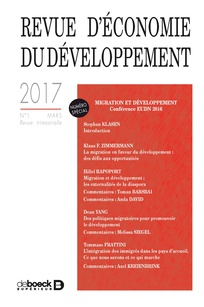L’intégration des immigrés dans les pays d’accueil-Ce que nous savons et ce qui marche
Abstract
Integration of immigrants is at the forefront of policy concerns in many countries. This paper starts by documenting that in most European countries immigrants face significant labour market disadvantages relative to natives. Then it discusses how public policies may affect immigrants? integration. First, we review the evidence on the effectiveness of language and introduction courses. Then, we discuss how different aspects of the migration policy framework may determine immigrants? integration patterns. In particular, based on a review of the recent literature, we highlight the role of visa length and of predictability about migration duration in shaping migrants? decisions on investments in country-specific human and social capital. Further, we discuss implications for refugee migration and also review the role of citizenship acquisition rules. The paper ends with an outlook of the consequences for sending countries.

